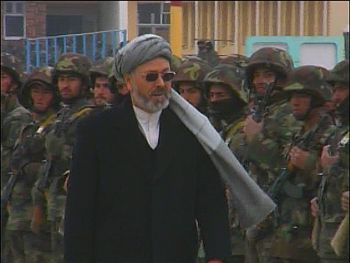
Publisher:
Bonnie King
CONTACT:
Newsroom@Salem-news.com
Advertising:
Adsales@Salem-news.com

~Truth~
~Justice~
~Peace~
TJP
Jul-17-2012 01:40

 TweetFollow @OregonNews
TweetFollow @OregonNews
How to Reform Afghanistan's Electoral System?
Salem-News.comNew paper deems it crucial to avoid complexity within the system and to educate the electorate on not merely how to vote, but how their vote will affect the government that forms.
 Afghanistan's Second Vice-President Abdul Karim Khalili, has been in his current office since 2002. 2007 Salem-News.com photo in Kabul, by Tim King |
(KABUL, Afghanistan ) - Following Afghanistan’s deeply flawed parliamentary election in 2010, calls for electoral reform among both national and international actors have been steadily gaining momentum. One major focus of criticism has been the country’s use of the single non-transferable vote (SNTV) system, which many argue must be scrapped or overhauled before the next set of legislative elections in 2015.
A new paper for AREU by international election experts Andrew Reynolds and John Carey explores how and why SNTV has been so damaging over the course of the last two rounds of legislative polls in 2005 and 2010. It argues that by choking political parties or other alliances of the oxygen they need to flourish, SNTV has left Afghanistan with a weak legislature, unable to advance coherent national policy programmes to deal with the country’s significant challenges. In addition, it highlights a raft of other problems that SNTV has either caused or exacerbated, exploring in particular the ways in which it has left the electorate struggling to see how their votes translate into meaningful representation.
It goes on to examine possible options for reform, including an analysis of a new draft Electoral Law proposed by Afghanistan’s Independent Election Commission in June 2012. Its broad recommendations are that:
• Any reform should build on the current system and avoid radical change.
• The complexity of the existing system can be reduced by having fewer MPs within each provincial constituency, leading to fewer candidates, a less fragmented vote, and more manageable ballots.
• Significant space needs to be created to encourage the development of political parties, while at the same time ensuring that opportunities remain for independents.
• It is crucial to avoid complexity within the system and to educate the electorate on not merely how to vote, but how their vote will affect the government that forms.
PLEASE NOTE CHANGE OF ADDRESS
Afghanistan Research and Evaluation Unit
House 649, third street on the right; Haji Yacoub Square toward Shaheed Square
Shahr-i-Naw, Kabul
Phone: +93 (0) 799 608 548
Email: publications@areu.org.af
Website: www.areu.org.af
Salem-News.com seeks:
-Investors
-Ad Sales
-Donations
-Volunteers
Since 2004, 24k articles; writers, 23 countries
Articles for July 16, 2012 | Articles for July 17, 2012 | Articles for July 18, 2012




googlec507860f6901db00.html
Quick Links
DINING
Willamette UniversityGoudy Commons Cafe
Dine on the Queen
Willamette Queen Sternwheeler
MUST SEE SALEM
Oregon Capitol ToursCapitol History Gateway
Willamette River Ride
Willamette Queen Sternwheeler
Historic Home Tours:
Deepwood Museum
The Bush House
Gaiety Hollow Garden
AUCTIONS - APPRAISALS
Auction Masters & AppraisalsCONSTRUCTION SERVICES
Roofing and ContractingSheridan, Ore.
ONLINE SHOPPING
Special Occasion DressesAdvertise with Salem-News
Contact:AdSales@Salem-News.com
Terms of Service | Privacy Policy
All comments and messages are approved by people and self promotional links or unacceptable comments are denied.
[Return to Top]
©2026 Salem-News.com. All opinions expressed in this article are those of the author and do not necessarily reflect those of Salem-News.com.